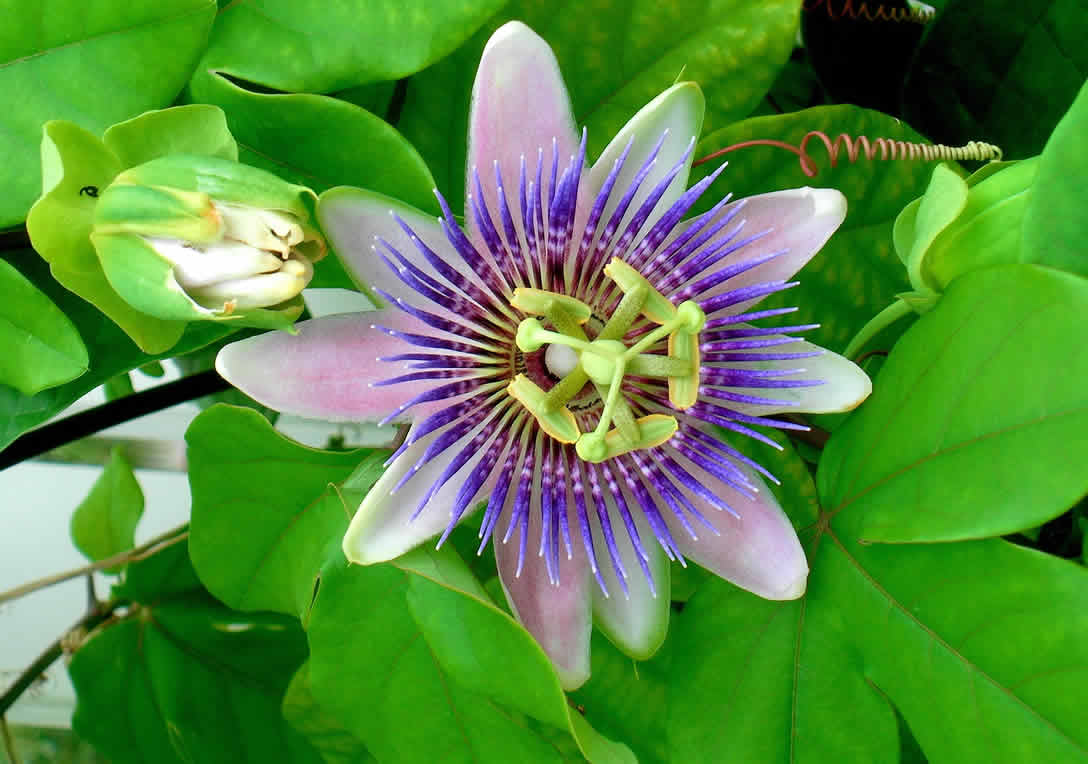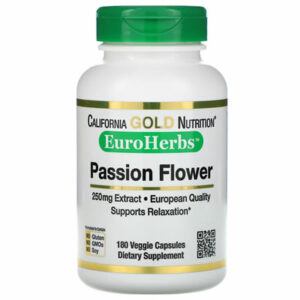Passion Flower is a plant with a distinctive appearance of flowers. It plays an important role in folk medicine in the world and claims to relieve anxiety and help sleep
Do you know passion flower benefits and side effects?
Table of Contents
- What is Passion Flower?
- What are the benefits of Passion Flower?
- Are there any side effects of Passion Flower?
- Safety Precautions
- Is there a recommended dose of Passion Flower?
- Where to buy the most recommended Passion Flower capsules?
What is Passion Flower?
The Passion Flower mentioned in this article belongs to Passifloraceae. It is a perennial climbing plant that is native to the southeastern United States and has been widely grown in tropical and Subtropical areas.
Passion Flower has more than 500 varieties around the world, among which passion fruit is the most famous member and an important tropical fruit.
The word Passion Flower comes from the Latin “Passio” because, in 1529, the Spanish “conqueror” described its flowers as a symbol of Christ’s “passion”.
Passion Flower has been used in folk medicine for a long time. The above-ground parts (leaves, stems, roots, and fruits) are used in different forms. In addition to being food seasonings, they are also made into tea drinks, liquid extracts, and tinctures. It is used for sedation, anti-spasm, anti-anxiety, blood pressure-lowering, anti-inflammatory, and sleep induction, so it has been valued in medicine.
What are the benefits of Passion Flower?
1. Improve generalized anxiety disorder
Generalized Anxiety Disorder is a syndrome of persistent anxiety or worries about events and thoughts, and patients often realize that this’s excessive and inappropriate.
These concerns usually trigger defensive and avoidance behaviors, and any activities that are considered dangerous, such as travel, may be delayed or simply not carried out.
Six main symptoms include restlessness, fatigue, difficulty concentrating, irritability, muscle tension, and sleep disturbances, three of which must appear in the diagnosis.
The etiology of generalized anxiety disorder is unclear, but traumatic life experiences, poor adaptation, genetic effects, and neurological dysfunction are considered as potential causes
In a preliminary double-blind randomized trial (a period of 4 weeks, targeting 36 patients with a generalized anxiety disorder), one group used Passion Flower extract and the other group took the drug oxazepam.
It was found that both Passion Flower extract and oxazepam had therapeutic efficacy. There was no significant difference between the two schemes at the end of the trial, but the side effects of the drug group were more (such as work performance impairment).
*Conclusion: Passion Flower extract may help to improve generalized anxiety disorder but is limited by the small sample size, and more large-scale trials are still supporting it.
2. Improve sleep quality
Sleep is one of the most instinctive and basic physiological needs in life. It can maintain health, psychological stability, endocrine, and immune functions, and is essential for maintaining emotional, memory, and cognitive functions.
It is estimated that between 50 and 70 million adults in the United States suffer from chronic sleep and wakefulness disorders, the incidence of women is higher than that of men (25% vs. 18%), and the prevalence of insomnia also increases with age, About 50% of the elderly are affected.
A double-blind, placebo-controlled study (1 week, for 41 patients with mild sleep quality) pointed out that drinking Passion Flower tea (each containing 2 g of Passion Flower dry leaves, stems, seeds, and Flower) can improve sleep quality.
*Conclusion: For those with mild sleep quality, ingesting passion fruit tea may be of positive help.
3. Reduce preoperative anxiety
Many patients experience a lot of anxiety before surgery, and it is reported to affect about 60% to 80% of surgical patients.
There are many reasons for preoperative anxiety, including the fear of death caused by anesthesia or surgery, and the fear of pain during surgery or after surgery.
Preoperative anxiety also often causes difficulties in venous access, delayed jaw relaxation, and cough during anesthesia induction, spontaneous fluctuations, and increased anesthesia requirements.
In addition, it is associated with increased postoperative pain, nausea and vomiting, increased recovery time, and increased risk of infection.
A double-blind, placebo-controlled study (targeted at 60 patients undergoing surgery) pointed out that taking Passion Flower extract can significantly reduce pre-operative anxiety (as measured by a numerical rating scale), but for the recovery mental exercise Function is not helpful.
*Conclusion: In the outpatient operation, oral administration of Passion Flower extract as pre-administration may reduce preoperative anxiety.
4. Opioid withdrawal treatment
Opioid drugs are chemical substances extracted from the poppy plant and are currently mainly used to manufacture narcotic analgesics such as oxycodone, hydrocodone, fentanyl, heroin, and morphine.
Opioids can bind to the receptors inherent in the human brain. In addition to their effective analgesic capacity, they can also produce euphoria, calmness, and relaxation, but they can also be highly addictive if used for too long or excessively.
Once addicted, it means that more drugs are needed to achieve the same effect. If you stop taking the drug, you will have withdrawal symptoms such as irritability, anxiety, irritability, insomnia, runny nose, watery eyes, cold and hot sweats, goosebumps, muscle Pain, abdominal cramps, nausea, vomiting, diarrhea, slower reaction time, etc.
A randomized double-blind controlled trial (a 14-week, 65 opioid addicts), one group used Passion Flower extract + clonidine, the other group used placebo plus clonidine.
It was found that both options were equally effective in treating the physical symptoms of withdrawal syndrome.
However, in the treatment of psychiatric symptoms, Passion Flower plus clonidine is significantly better than the use of drugs alone.
*Conclusion: For opioid withdrawal treatment, Passion Flower extract may be an effective adjuvant.
5. Improvement of menopausal symptoms
Menopause generally refers to Menopausal transition, or “perimenopause”, which is a definite period, starting from the irregular start of the menstrual cycle to the last menstrual cycle, characterized by fluctuations in reproductive hormones.
The characteristics of this period include irregular menstruation, long menstrual duration, heavy menstrual flow, amenorrhea, vasomotor symptoms (hot flashes), irritability, mood swings, insomnia, vaginal dryness, difficulty concentrating, incontinence, osteoporosis, depression, headache, and other symptoms.
A clinical study (6 weeks, 59 women with menopausal symptoms) pointed out that whether it is Passion Flower or Hypericum extract, it can help to improve the symptoms related to menopause, especially vasomotor symptoms, insomnia, depression, anger, and headaches are most pronounced.
*Conclusion: Oral Passion Flower extract may have a positive effect on the improvement of menopausal symptoms in women, but it is limited by the small sample size and more large trials are still needed to confirm it.
Are there any side effects of Passion Flower?
It is safe for most people to use Passion Flower at an appropriate dose in the short term, such as for food flavoring, as a tea drink or related extract preparations. Side effects that have been reported include nausea, vomiting, drowsiness, dizziness, Rapid heartbeat, altered consciousness, coordination disorders, vasculitis, etc.
Safety Precautions
1. Do not use it for pregnant women, because there are some chemicals in Passion Flower which may cause the uterus to contract.
2. Women and children who are breastfeeding should not use it because the related safety is unknown.
3. If you plan to take Passion Flower within two weeks before and after surgery, please consult your healthcare provider to avoid possible adverse reactions or drug interactions.
4. Do not use with sedatives (central nervous system inhibitors), it may enhance the effect of drugs, related drug names are pentobarbital, secobarbital, clonazepam, lorazepam, zolpidem.
Is there a recommended dose of Passion Flower?
There is no best-recommended dose of Passion Flower, the dose used in related clinical trials is for reference only.
Anxiety: The capsule contains 400 mg of Passion Flower extract twice a day for 2-8 weeks or 45 drops of liquid extract preparation per day for up to one month.
Where to buy the most recommended Passion Flower capsules?
In recent years, food safety problems in various countries have exploded, and it is not healthy but black-hearted products that everyone spends on. Therefore, European and American products with relatively strict quality control have become popular products.
And iHerb.com is a large-scale medical cosmetics e-commerce company in the United States. It has a high satisfaction rate of 97% in the evaluation of Google customers. It provides global home delivery so that you can buy it without risking buying fakes through purchasing high-quality health products.

